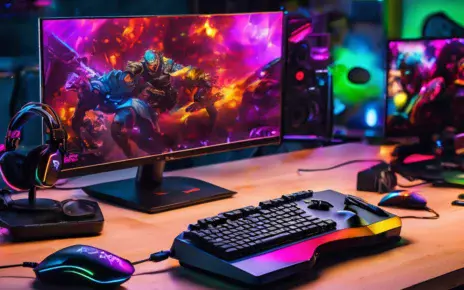Here’s an expanded and optimized version of your blog post, “How to Master Game Mechanics Quickly.” This version incorporates more detailed explanations, examples, and additional tips to enrich the content while maintaining an SEO-friendly structure.
Introduction
Game mechanics are the foundational rules and systems that create the gameplay experience we all know and love. They’re like the secret sauce that makes a game unique, influencing everything from scoring systems to character controls. Understanding game mechanics is essential for both aspiring game developers and players looking to improve their skills. In this guide, we’ll explore how to master game mechanics quickly, helping you elevate your gaming experience to new heights.
Understanding Game Mechanics: Core vs. Auxiliary
To master game mechanics effectively, it’s important to differentiate between core and auxiliary mechanics.
- Core Mechanics: These are the essential parts of gameplay. Think movement controls in a platformer, where the player must jump, run, and climb to navigate through levels. In a fighting game, core mechanics might include attack combos, blocking, and grappling systems. These mechanics are fundamental to the gameplay and dictate how players interact with the game world.
- Auxiliary Mechanics: On the other hand, auxiliary mechanics are the extra layers that add depth and variety. Examples include collectible items in RPGs, crafting systems in survival games, or environmental interactions that can influence gameplay, such as destructible objects or weather systems. While not essential for the game to function, these mechanics enrich the experience and can significantly enhance player engagement.
These mechanics are crucial in hooking players and keeping them engaged. A well-designed game often balances challenge and accessibility, ensuring players are neither overwhelmed nor bored. Mechanics should evolve with a player’s growing skills while remaining understandable and intuitive.
Examples of Masterful Mechanics in Games
For example, consider games like “Portal” and “Dark Souls”. “Portal” utilizes unique mechanics such as the portal gun, which allows players to create interdimensional portals to solve complex puzzles. This mechanic not only challenges players’ problem-solving abilities but also keeps them engaged through innovative gameplay.
Conversely, “Dark Souls” emphasizes precise timing and strategy through its combat mechanics. Players must learn enemy patterns, manage stamina, and time their attacks for success. The challenge lies in mastering these mechanics, making victories all the more rewarding. Both games illustrate how mechanics can engage players in a narrative, making mastery crucial for success.
Learning Through Practice and Repetition
Mastering game mechanics requires consistent practice. Intentional practice sharpens your skills and makes mechanics second nature. Here are some effective strategies to help you improve:
1. Set Measurable Goals
Establish specific objectives for your practice sessions. Instead of attempting to master everything at once, focus on one mechanic at a time. For instance, if you’re playing a fighting game, dedicate a session to mastering your character’s combos. This targeted approach helps you notice improvements faster and keeps your motivation high.
2. Utilize Tutorials and Practice Modes
Don’t underestimate the value of tutorials and practice modes. Developers create these tools to help players grasp new skills and mechanics. Make use of them to familiarize yourself with gameplay nuances quickly. For example, many first-person shooters offer a training mode where players can practice aiming and movement without the pressure of competition.
3. Track Your Progress
Keeping a record of your improvements can provide insight into your growth as a player. Use notes, video recordings, or apps to monitor your skill development. This helps maintain motivation and allows you to celebrate small victories along the way. You might notice that your reaction times are improving or that you can execute complex maneuvers with more confidence.
4. Embrace Consistency
Consistency is key when mastering game mechanics. Set aside dedicated time each week to practice. Regular sessions help reinforce learning and ensure that mechanics become ingrained in your muscle memory. Whether it’s a daily 30-minute practice or a longer weekly session, find a routine that works for you.
Leveraging Community Resources and Expert Guidance
Getting involved with gaming communities can significantly enhance your learning experience. Here’s how you can benefit:
1. Join Online Forums and Groups
Engage in discussions on platforms like Reddit, Discord, or dedicated gaming forums. These spaces are treasure troves of shared knowledge where players exchange tips, strategies, and updates about their favorite games. Participating in these discussions not only broadens your understanding of mechanics but also allows you to connect with fellow gamers.
2. Consider Coaching and Mentorship
If you’re serious about improving, consider hiring a professional coach. Many seasoned players offer coaching services tailored to your specific needs. A coach can provide insights focused on your strengths and weaknesses, helping you master game mechanics more effectively. Personalized guidance can help accelerate your learning curve and boost your confidence.
3. Watch Experienced Players
Observing pro gamers can be incredibly informative. Pay attention to their strategies, techniques, and decision-making processes. Platforms like Twitch and YouTube are filled with gameplay videos, tutorials, and live streams from experienced players. Take notes and try to incorporate their approaches into your own gameplay. For instance, watching a speedrunner can reveal shortcuts and techniques you might not have considered.
4. Engage in Community Events
Participating in community events such as tournaments or game nights can provide valuable experience. These events often expose you to different playstyles and strategies, enhancing your understanding of game mechanics in a competitive environment. Plus, they’re a great way to meet fellow gamers and expand your network.
Adapting and Innovating for Personal Growth
To grow as a gamer, regularly evaluate how you use different mechanics:
1. Identify Strengths and Weaknesses
Understand what mechanics come naturally to you and which ones require more effort. This awareness allows you to focus your practice effectively. For example, if you excel at shooting mechanics but struggle with movement, prioritize practice sessions that emphasize movement techniques.
2. Experiment with Play Styles
Don’t be afraid to try new strategies or unconventional approaches. Mixing things up can expose you to different tactics and help you adapt to various gaming scenarios. For instance, if you typically play aggressively, consider adopting a more defensive playstyle in certain situations to improve your overall adaptability.
3. Learn from Mistakes
Mistakes are valuable learning opportunities. Analyze what went wrong and how you can improve next time. Building resilience through these experiences enhances your ability to tackle challenges in the future. For example, if you fail to complete a level, take time to reflect on what strategies didn’t work and how you can adjust your approach.
4. Encourage Creative Problem-Solving
Look for innovative solutions to obstacles in games. Challenging established norms and thinking outside the box can breathe new life into your gameplay and make mastering mechanics even more exciting. Try to develop your unique strategies that incorporate both core and auxiliary mechanics in creative ways.
Conclusion: Mastering Game Mechanics for a Better Gaming Experience
Mastering game mechanics is essential for anyone looking to elevate their gaming experience. By understanding core and auxiliary mechanics, practicing intentionally, leveraging community resources, and fostering a mindset of adaptation and innovation, you can quickly improve your skills.
Whether you’re a budding game designer or an avid gamer, these strategies will help you gain a deeper understanding of gameplay dynamics and enhance your overall experience. With dedication and the right approach, you’ll be well on your way to mastering game mechanics and enjoying every moment of your gaming journey.
Final Thoughts: Remember, the most successful gamers are those who remain curious and adaptable. Embrace the learning process, and don’t hesitate to seek out resources and communities that can help you grow. With each step, you’ll not only become a more skilled player but also deepen your appreciation for the artistry behind game mechanics.




